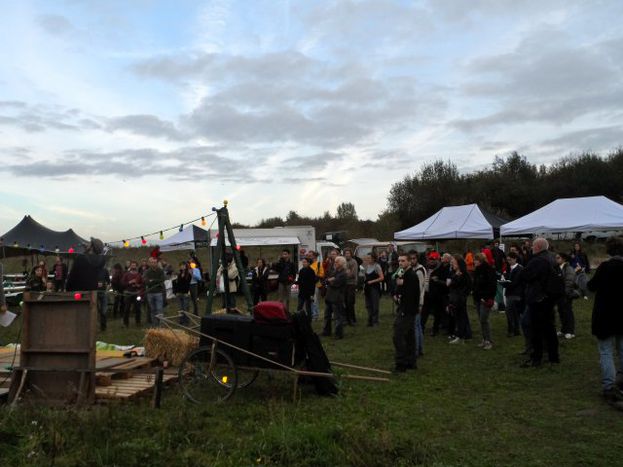
The Zapatistas of the Belgian Campaign ?
Published on
Translation by:
Danica Jorden"Potatista Fight" in Haren: anti-mega-prisons and pro-land rights amidst great confusion
If the play on words in the event's title reminds you of the Mexican revolution, the various Zapatista movements in Latin America, or even the demands of Sub-comandante Marcos in the Chiapas region, you're off the mark. What took place in Haren on 17 October, despite its name, brought to mind more a neighbourhood, country fair designed for sharing thoughts and ideas, rather than the ideological struggle of the Zapatistas.
Ideological, yes, but which one?
The confusion was great. The "Potatista Fight" came about because of the coming construction of a mega-prison on the outskirts of Brussels, a few kilometres from Zaventem Airport. Concerns over the new prison's construction came to be linked with the greater demand for public access to the land for all: “No land without farmers, no farmers without land” goes the event's motto. Overexploitation of the land, profits of unscrupulous agricultural multinationals, disappearance of small family farms, paving and overdevelopment of suburbs and unrestrained capitalism were only a few of the themes focused on. But behind these pure and noble complaints, it was not easy to find the common thread leading to “no” mega-prison. Especially when the ideologies meeting behind the protest turned out to be so disparate: ranging from pseudo-Zapatista aspirations, to expressing opposition to a single project – the mega-prison - to harsh criticism of the capitalist model of animal husbandry and agriculture, and finally arriving at an anarchic “against all prisons,” leaving at least everyone who believes in a society based on a social contract perplexed.
What does it have to do with potatoes?
The initiatives were still an interesting starting point for discussion and gathering. In fact, in mid-April, on the same land where the federal government wants to build the prison, potatoes were planted (from which the protest got its name) as well as other vegetables by five hundred participants, supported by some sixty organizations. In the same place six months later, they offered a large, friendly, free dinner out of the potatoes planted that spring. Earlier, the day's events started with preparing the fields for next season when the ritual will be repeated, works for the prison permitting. Interesting discussions took place later in which all were invited to share their cultivation methods, GMO and food sovereignty. There were about ten stands on the grounds, showing diverse initiatives involving organic food, environmental sustainability and food security.
Against a genuinely pastoral backdrop, the occupation of the fields against the jail's construction, the shared battle to restore dignity to the city's outskirts and the combat against overdevelopment of the last cultivable areas in the Brussels-capital region have made this event an important forum where ideas and proposals were brought to light. A moment where one could stop to reflect on the dangerous consequences of our most banal, everyday actions.
In spite of all this, the different entities behind the “Potatista Fight” created ideological confusion, with a bulk of unstructured demands that positioned the event between a NIMBY (Not In My Back Yard) protest, an alter-globalist event and a country festival, rendering participants' voices inaudible in the halls of power. They don't coexist in harmony and are often in contrast with a macroscopic perspective: for example, how to demand the right of land for all in a world where fewer wish to farm and cultivate it?
Translated from Gli zapatisti della campagna belga?



